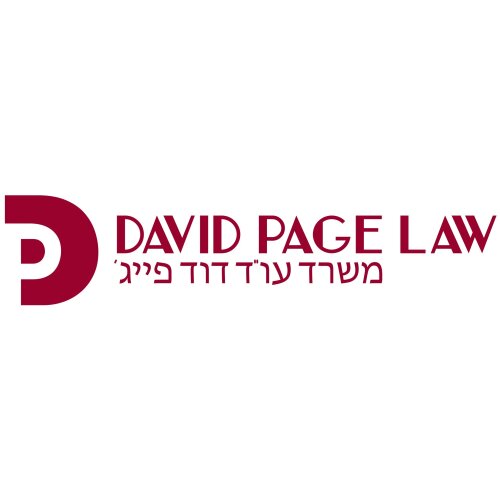Best Tax Increment Financing Lawyers in Jerusalem
Share your needs with us, get contacted by law firms.
Free. Takes 2 min.
List of the best lawyers in Jerusalem, Israel
About Tax Increment Financing Law in Jerusalem, Israel
Tax Increment Financing (TIF) is a tool for financing urban development and infrastructure projects by capturing the increased tax revenue generated from the resulting improvements. In Jerusalem, Israel, TIF is used to stimulate growth and redevelopment in areas that need revitalization. The financing is generally aimed at enhancing public infrastructure, thus encouraging private investment in the region. Projects that benefit from TIF can range from urban renewal initiatives to the construction of public amenities and transportation infrastructure. The mechanism allows for the reinvestment of tax increments, which are the differences between pre- and post-development tax revenues, back into the community.
Why You May Need a Lawyer
There are several scenarios where seeking legal advice regarding TIF in Jerusalem could be crucial. Developers and investors often require assistance in navigating the complex legal framework to ensure compliance and to maximize their financial and strategic benefits. Property owners might need legal counsel to understand how TIF projects could affect their property's value or tax obligations. Municipal authorities and local governments may also require legal assistance in structuring TIF agreements to align with urban development policies while safeguarding public interests. Engaging a lawyer can help in understanding obligations, drafting documents, negotiating agreements, and resolving potential disputes.
Local Laws Overview
The TIF mechanism in Jerusalem operates under specific local laws and regulations that govern its application. Key aspects include eligibility criteria for projects, the establishment of TIF districts, and the processes for approving and managing TIF initiatives. Legal statutes emphasize transparency and public engagement in the approval process, ensuring community benefits and minimizing displacement risks. Additionally, there are regulations surrounding the financial management of TIF districts, including the allocation of funds and reporting requirements to ensure accountability. Understanding these laws is critical for stakeholders to leverage TIF effectively.
Frequently Asked Questions
What is the purpose of TIF in Jerusalem?
TIF aims to stimulate economic development and urban renewal by investing in infrastructure and public spaces, attracting private investment, and enhancing the overall quality of life in targeted areas.
Who can use TIF as a financing tool?
Developers, property owners, and local governments primarily utilize TIF to fund infrastructure and redevelopment projects that benefit the community and increase tax revenues.
How is the TIF district established?
A TIF district is designated by local government authorities based on criteria such as underdevelopment or the need for economic revitalization, and it requires formal approval through a public process.
How are TIF funds allocated?
TIF funds are typically allocated towards infrastructure improvements, public works, and development projects within the designated district to support growth and increase property values.
What are the risks associated with TIF?
Risks include potential for inadequate tax increment growth, which could affect the funding of improvements, and community concerns over gentrification or inadequate public benefits.
Can TIF affect my property taxes?
Yes, property values and, consequently, property taxes within a TIF district may increase due to improvements and development, but the increment is reinvested into the area.
Are there public consultations for TIF projects?
Yes, public consultations and transparency are integral to the TIF approval process, ensuring community needs and opinions are considered in project planning.
How is the success of a TIF project measured?
Success is measured through economic indicators such as increased property values, business activity, job creation, and improved infrastructure and amenities.
What happens if a TIF project does not generate expected revenues?
Control mechanisms and financial modelling are used in the planning phase to mitigate this risk, but if shortfalls occur, adjustments to project scopes or financing methods may be necessary.
Is TIF the same as a tax abatement?
No, TIF captures and reinvests tax increments in a district, whereas a tax abatement typically involves reducing or eliminating taxes to incentivize development.
Additional Resources
For further information, individuals can consult with the Jerusalem Municipality, local chambers of commerce, or economic development agencies. Information can also be found through legal firms specializing in urban development and finance, as well as governmental bodies overseeing economic planning and infrastructure development.
Next Steps
If you require legal assistance with TIF in Jerusalem, consider reaching out to a lawyer specialized in real estate, municipal law, or urban development. Initial consultations can provide clarity on how TIF may impact your interests. Compile any relevant documentation regarding your property or proposed project and seek expert advice on navigating the legal framework effectively. Engaging with community meetings or public consultations can also provide valuable insights and networking opportunities with other stakeholders.
Lawzana helps you find the best lawyers and law firms in Jerusalem through a curated and pre-screened list of qualified legal professionals. Our platform offers rankings and detailed profiles of attorneys and law firms, allowing you to compare based on practice areas, including Tax Increment Financing, experience, and client feedback.
Each profile includes a description of the firm's areas of practice, client reviews, team members and partners, year of establishment, spoken languages, office locations, contact information, social media presence, and any published articles or resources. Most firms on our platform speak English and are experienced in both local and international legal matters.
Get a quote from top-rated law firms in Jerusalem, Israel — quickly, securely, and without unnecessary hassle.
Disclaimer:
The information provided on this page is for general informational purposes only and does not constitute legal advice. While we strive to ensure the accuracy and relevance of the content, legal information may change over time, and interpretations of the law can vary. You should always consult with a qualified legal professional for advice specific to your situation.
We disclaim all liability for actions taken or not taken based on the content of this page. If you believe any information is incorrect or outdated, please contact us, and we will review and update it where appropriate.

















